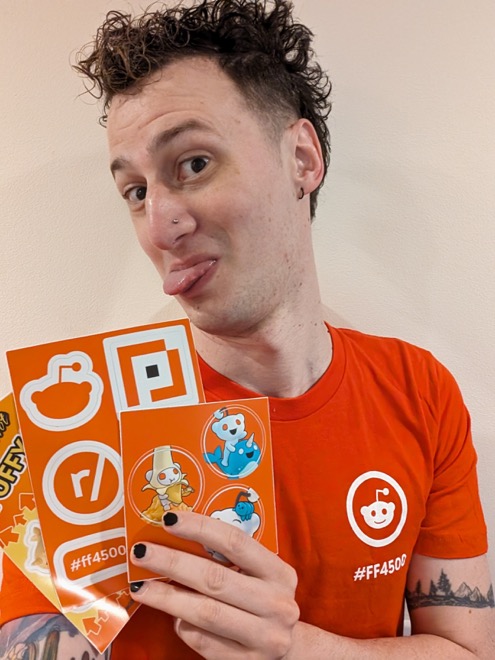Synopsis: I took a 10-month sabbatical between tech jobs. Here’s how it went for me, and what worked and didn’t!
A year ago, I was ready for a change at work. I’d spent nearly four years working in government contracting, a USDS-inspired jaunt leaving big tech for the world of mission-driven work to make government services more functional. I loved the work, but boy oh boy did government contracting come with a lot of unique frustrations (a blog post for a separate time). Plus, I had fried my ability to focus on anything for more than five minutes! I’d spent those four years in manager/director-level roles, rushing between fires and being supremely available to whoever needed me on Slack. I started looking for new jobs, but I pretty quickly realized I wouldn’t be able to show up to a new job with the spark and enthusiasm it deserved. I was burnt out.
So when a friend mentioned he was taking the summer off before looking for his next job, I immediately knew — that’s what I need! I gave a two-month notice (honestly, too long), wrapped up my work, and started planning for a fun summer starting in June. I planned to give myself at least three months before I started looking for work, but knew I could comfortably afford a whole year off if needed. And for the first time in my life, I had no plans for my next occupation, and stepped out into a break.
I’m writing now from the other side. It turned into a ten-month break, a well-needed respite, and a personal rollercoaster. So here’s what my experience was like, some tips on what worked for me, and thoughts on what I’d do differently next time. I appreciated reading others’ experiences before doing this myself, so this is my contribution!
Timeline
Planning
I made a big list of plans and ideas: festivals to attend, hobbies to dive into, games and TV shows to binge, books to read, cuisines to try cooking a bunch of, home decor and renovation projects to do. I didn’t have a big, central project—no six-month backpacking trip, no Great American Novel to write—just open-ended time and an infinite list of things I’d do, “if only I had the time”.
I spent a few months saving heavily toward a “sabbatical fund”, and deciding how much of my existing savings I was willing to burn. I gave myself a 3-12 month window, figuring I’d start looking for jobs after the summer, or potentially longer if I wasn’t ready to go back yet.
Months 1-3: Decompression
My first few months were about chilling. My stated goal: veg out until I got bored of that and had to start doing things again. Tears of the Kingdom had just come out, so I spent a month mostly just playing that, peppered with some TV-show binging, lots of sleep, and very few social palns.
I also scheduled my early months more densely than “decompression” required. I went to Bonnaroo, my first music festival I’ve camped at, as a cross-country affair. My sibling visited from Belgium and hung out for a week, where we packed it with social plans and home projects.
Six weeks in, I was annoyed that I didn’t feel “rested” yet. Part of that was how densely I’d packed those first weeks, but another part was just an impatient estimate. When I talked with other friends who’d done a break like this, most of them said it took a solid 3-4 months before they felt decompressed. And that lined up with my experience.

Month 4-5: Starting new things
Eventually I hit a point of lethargy—where my low-energy resting turned from restorative to just feeling… blah. It took me a couple weeks to identify that, but I was happy once I had: that was the goal! And I knew it was time for the next phase.
I started taking on projects from my list, as well as some new hobbies. I started playing pinball, working out regularly, reading some books, working on some writing, and doing a few quality-of-life tech projects. I tried a pole class for the first time, and I started on a big tattoo sleeve project! But it quickly became “too many things” with none of them really holding my attention, and it was still easy to fritter time away just scrolling.
So, after reading Johann Hari’s “Deep Focus”, I tried some self-imposed structure: short daily time limits on my phone’s social media apps, blocked-out time for reading, working out, making food, creative time, project time—and even “fun time” to still let myself binge TV shows, just in smaller amounts. I had a couple different daily schedules I’d rotate between to keep things interesting, some focused more on “life maintenance”, some focused more on creative time or reading.
This was one of my favorite periods: some restored energy after a break, and a structure that pushed me to do lots of things I wanted to do!
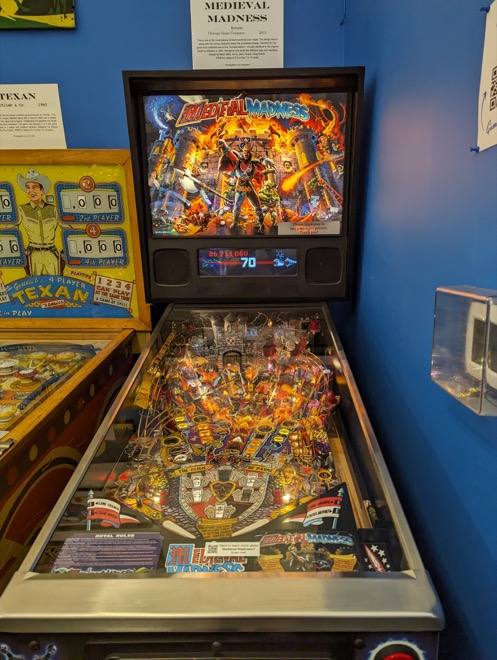
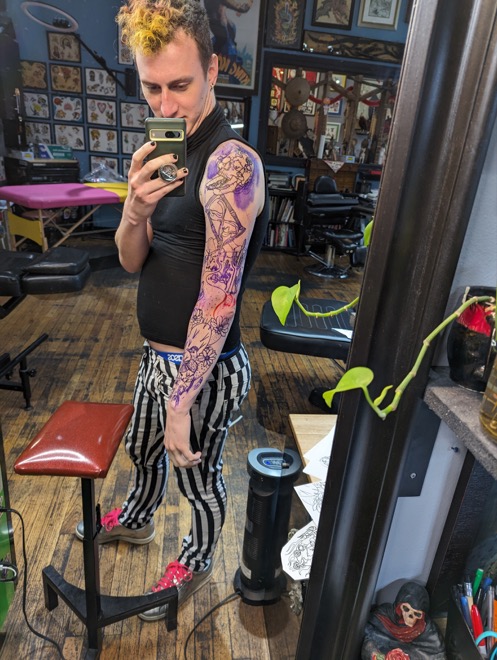
Months 6-7: turmoil and depression
Unfortunately, it took a turn for the worse. I had some ongoing emotional/relationship challenges through the entire sabbatical that took over a lot of my headspace, and that made it hard for me to focus on the parts I wanted to.
This led to a deeper lethargy and a state of (maybe?) depression. I don’t have a history of depression, I’m generally quite an active, focused, energetic, and upbeat person. But the combination of not having a job (or similarly central commitment) anchoring my life with added emotional turmoil left me spending a lot of days ruminating, with hours spent texting and calling people and journaling.
And without a clear end in sight, I hit a worst point of the sabbatical, getting stuck in a mental cycle of “wow, this feels like it was all a waste.”
So, I started a job search—figuring “well, if my relationship difficulties are going to be affecting my well being this much, I may as well go back to working at least.”
At this point, it’s late fall, which turns out to be a rough time to start a job search. I spent a few weeks doing interview prep, and did a few full interview loops in November, but the promising ones held off getting back to me until after the holidays with deciders on extended vacations. And most other hiring shut down through the holidays. So I took a minute to just chill.
Oh and, then my appendix tried to kill me just before Christmas, so it had to go.
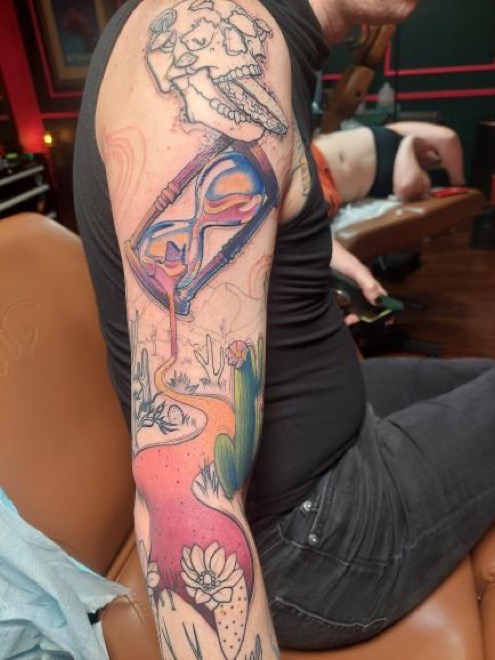
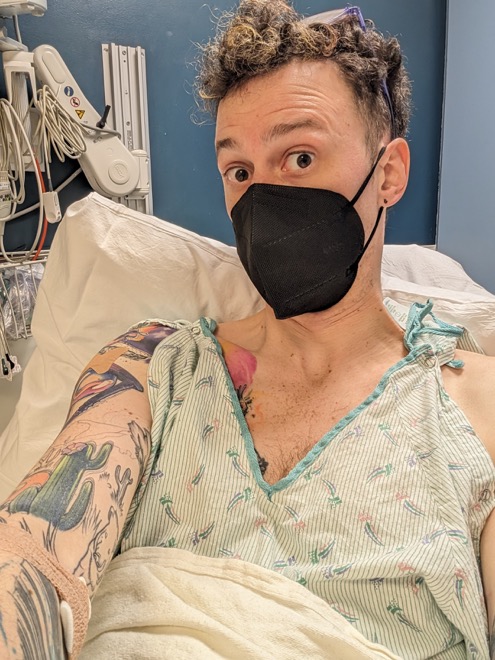
Months 8-9: turning a corner, job search
After the holidays, finding a job took most of my attention.
I found an anxiety medication that worked for me, after trying a few medication options with my doctor. That helped me chill out through some of my personal stress.
In this period, I finally got into cooking! One of my long-running projects was a partial kitchen remodel, that stretched out over 9 months mostly to do 1 month of work. Getting that finished became an opportunity for me to put a burst of energy into cooking, which had been one of my big sabbatical goals that I’d been pretty down about not yet getting to.
One helpful realization I had: even if I was struggling to make headway on bigger creative projects, I could still do a cooking adventure in just a single day: finding an interesting recipe, going to the grocery store, and cooking that new dish. I adjusted my social media feeds to start bringing me lots of cooking content, and pushed myself to make something new every opportunity I had! And as a result got to make a lot of interesting dishes (mostly Japanese and Italian, with a little Korean and Indian cooking).
But most importantly, I found a job! And somehow lined up two good offers that I was able to negotiate up with. Getting tech jobs has been in a difficult phase for awhile, but I have a good network and a strong resume and was fortunately able to find something without too much difficulty—though the overall process did still take about 5 months from start to finish.
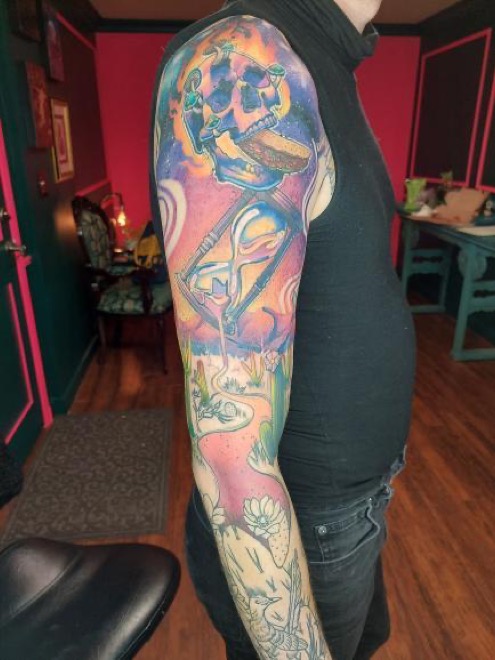


Month 10: sprint to the end
When negotiating my offer, I gave myself a long final window before starting, knowing that with a “deadline” looming I’d probably be able to get through a lot more. And boy did I. I jumped into the next few weeks with a fire under me, trying to do.
I built a new computer (which was a whole ordeal). I fixed nagging issues in my wifi, my refrigerator, my Kindle, and my home‘s smoke detectors (read: I didn’t have working smoke detectors. oops.). I redid my music area and started making music again. I read a whole book. I cleaned out lots of junk and gave dozens of things away on BuyNothing. I wrote a little Go every day to ramp up for my job. I made new recipes. I cleaned my place and got everything organized.
It was the most productive, energetic five weeks of my entire sabbatical. And that really cemented how I look back on the harder periods: with an understanding that open-ended, unstructured time is hard for me, and that I need something extra to keep myself on track.
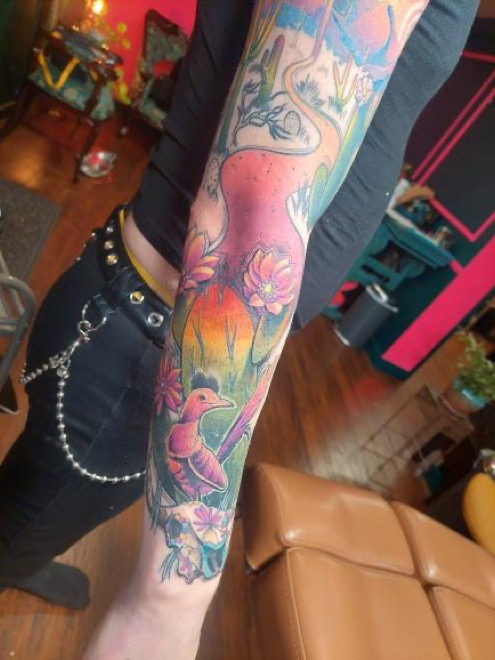
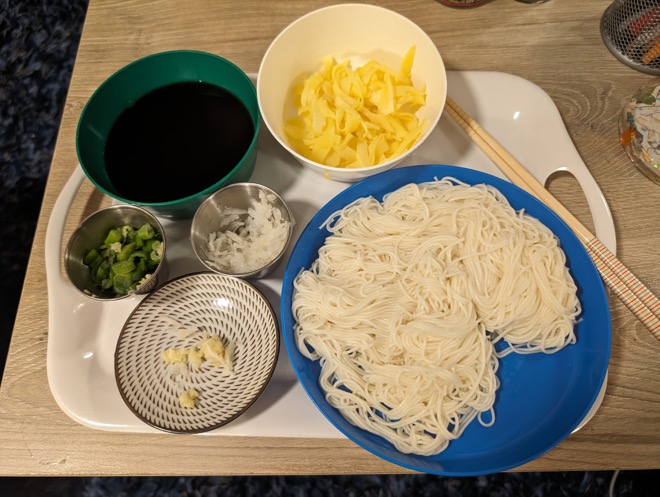

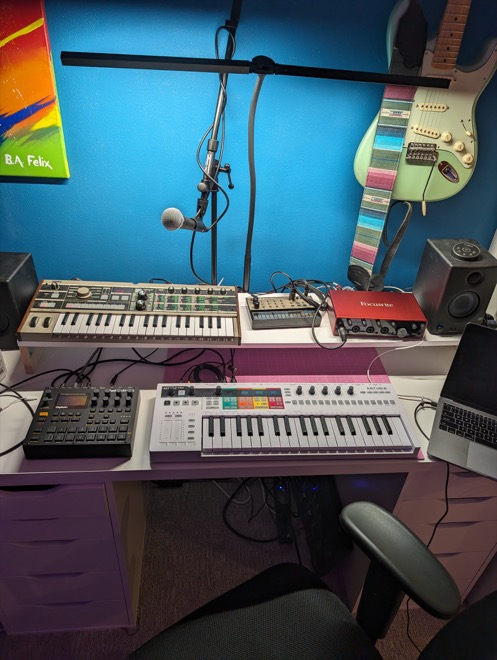
Takeaways for next time
I’d love to do this again in the future the next time I’m between jobs. So this list is just as much for future me as it is for y’all reading it.
Timing the break
- Making sure my last day was at the start of the month (June 2nd) gave me health insurance coverage through June and gave me a little time to figure out the bridge to a state plan.
- I quit in June to align with Seattle summer’s “maximum fun” vibes, but I was so burnt out I needed time to decompress first with low plans, and that led to me skipping out on some things I would’ve wanted to do otherwise. Quitting a month or two earlier would have given myself some time to rest before launching into a very full summer.
- I gave my manager over two months’ notice, since I had a director role that I assumed would take some time to backfill and hand off responsibilities. What I didn’t know is that the company wouldn’t replace me (out of budget issues that year), so even with a slow transition handing my responsibilities off to peers, I ended up just chilling the last few weeks.
- Job search timing was tricky with the tech hiring market being in a slump. I knew that was the case when I started my sabbatical, and hoped it might be better in 6-9 months, but that didn’t happen.
- Further, starting my job search in October just meant heading into winter break, where a lot of hiring slowed down. It didn’t seem to pick up again until late January. I think I would have been better served not attempting job search in the fall.
- I super appreciated the time between “having a job offer” and “starting my job”. I would definitely recommend making that window as long as possible in the future.
Pre-planning what to do
- Having some plans already made and a long list of things I wanted to watch, read, play, and do helped me picture what the time off could look like and get excited about it. While I didn’t have a big “backpack Europe for three months” or “write the next Great American Novel” plan, I had a long list of ideas to draw from that generally kept me from getting stagnant.
- That said, not having a big, central commitment or structure to my day still got to me over time, and it was easy to fall into periods of lethargy or maybe-depression. I’d want to take this failure mode more seriously next time.
- Friends who’ve taken more extended breaks have talked about pushing through to discover more about themselves, but that it took more like 18+ months to get there. I do wonder what a longer break could do for me.
Scheduling my day-to-day
- Having structured days helped me make sure I was keeping a balance of healthy activity, reading, stretching, projects, and fun time—rather than just letting entire days get sucked into a binge. A key insight here was that I typically get just as much “fun” out of 60-90 minutes of gaming as I do in 4+ hours, but that if I stick to the shorter time then I can also enjoy other activities with my time.
- I struggled getting out of bed before 10am on days without a forcing function, but I love the feeling of getting up early and having a productive morning. Scheduling phone calls, medical appointments, etc. in the mornings helps me get moving.
- Next time, I’d consider hiring a “life coach” or similar—someone to hold me accountable to not just falling into pits of lethargy or distraction. I found self-accountability less effective than other people having expectations of me, whether that’s social commitments to friends or the deadlines and expectations of an actual job.
Budgeting
- I planned to keep my lifestyle mostly as-is rather than try to reduce costs to prolong the sabbatical. The thought was, “if I can’t afford the things I want to do, then I shouldn’t be on sabbatical”. More practically, fixed expenses made up the bulk of budget, so a little less spending on eating out or concert tickets wouldn’t have substantially affected the timeline anyways. I’d take this approach again next time.
- My baseline expenses are high, and that shortened how long I could do this. I live in a large, party condo with a great view, in a central neighborhood of a HCOL city, and that was fully half of my expenses. Selling my place and moving just to extend the break could have been an option, but would have been quite disruptive and a drag on quality of life. Nothing to be done here, just the reality of the situation.
- I went back and forth mentally on “how long can I do this?”, knowing I could dip into investment accounts for years’ worth of sabbatical funds, but the more I did that would dig into eventual retirement years. There wasn’t really an obvious line to draw. But when I ran through my sabbatical set-aside + my 3-month “emergency fund” and started dipping into investments, that “felt” like the right time to find work again. In hindsight, I spent a lot of unnecessary energy stressing about this question.
Mental reset
- Taking time off to fully decompress and let myself turn off my brain was great. I had planned to give myself a month for this, but expecting 2-3 months would have been more accurate.
- I’ve had mixed results reclaiming focus. Reading Johann Hari’s “Stolen Focus” points to a lot of social and technological reasons why this is the case, but even with some intent and a lot of time I still struggled to put my phone away and be present in other activities. Finding flow state was exciting the handful of times I was able to get there, and I wish I’d done it more, but boy am I into the dopamine that comes from texting friends and partners.
- Using a smart watch actually helped with focus—knowing that an important text would buzz my wrist let me set everything else to do-not-disturb and let me avoid picking up my phone every five minutes to check for notifications. I only wore the watch intermittently, but when I stuck to it I was able to focus better.
That’s a wrap
That’s that! I definitely recommend taking time off to decompress between jobs if you’re able—I recognize this is very much a tech-income-with-no-dependents privilege I’ve got. I will do this again, but next time would target either 3-4 months (enough time to decompress but not get lost) or for 18+ months (enough time to get a different kind of life going)—or just need a more specific something in mind to anchor my schedule around.
